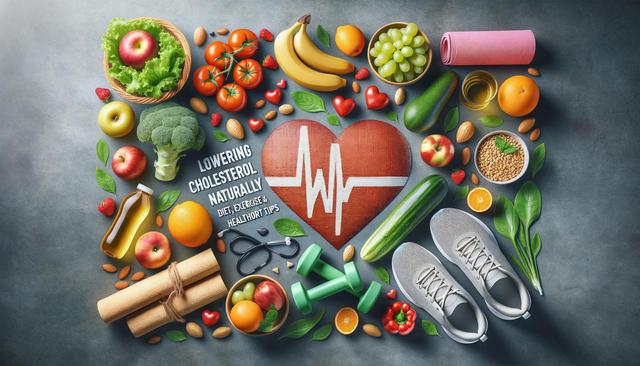
Lowering Cholesterol Naturally: A Balanced Path to Heart Health
Understanding Cholesterol and Its Impact on Heart Health
Cholesterol is a waxy substance found in your blood that plays essential roles in building cells and producing hormones. However, when levels of LDL (low-density lipoprotein), often referred to as ‘bad’ cholesterol, become too high, it can lead to the buildup of plaque in arteries. This increases the risk of heart disease and stroke. On the other hand, HDL (high-density lipoprotein), or ‘good’ cholesterol, helps remove excess cholesterol from the bloodstream. Balancing these levels is critical for cardiovascular well-being. Natural methods to lower cholesterol can be both effective and sustainable when integrated into a healthy lifestyle.
Several factors influence cholesterol levels, including genetics, diet, physical activity, and overall lifestyle choices. While medications are available, many people can manage their cholesterol through natural approaches. These methods not only help lower cholesterol but also contribute to overall heart health and longevity.
Adopting a Heart-Healthy Diet
One of the most effective ways to lower cholesterol naturally is through dietary changes. Choosing the right foods can significantly reduce LDL cholesterol and improve HDL cholesterol levels. A heart-healthy diet focuses on whole, nutrient-dense foods and limits saturated fats and trans fats, which are known to raise LDL levels.
Incorporate these foods into your daily meals:
- Oats, barley, and other whole grains, which contain soluble fiber
- Fruits like apples, grapes, and citrus that are high in pectin
- Legumes such as lentils, beans, and chickpeas
- Fatty fish including salmon and mackerel, rich in omega-3 fatty acids
- Healthy fats from nuts, seeds, and olive oil
Reducing your intake of red meats, processed foods, and full-fat dairy products can also make a noticeable impact. Replacing them with plant-based alternatives or lean protein sources is a practical step toward better cardiovascular health.
Exercise and Physical Activity for Cholesterol Control
Regular physical activity is another essential component of managing cholesterol. Exercise not only boosts HDL cholesterol but also helps lower LDL and triglyceride levels. Moreover, it supports weight management and reduces the risk of other chronic conditions that contribute to poor heart health.
Recommended activities include:
- Brisk walking for at least 30 minutes most days
- Cycling, swimming, or dancing as enjoyable aerobic exercises
- Strength training twice a week to improve metabolism
- Yoga or stretching to enhance circulation and reduce stress
Consistency is key. You don’t need to train like an athlete; moderate, regular activity can produce meaningful improvements in cholesterol levels over time.
Smart Lifestyle Changes That Support Healthy Cholesterol
Beyond diet and exercise, certain lifestyle habits can significantly influence cholesterol levels. Making conscious daily choices helps create a holistic approach to heart health. Smoking cessation, for instance, can improve HDL cholesterol and blood circulation almost immediately. Similarly, managing stress effectively can prevent hormone imbalances that may affect lipid levels in the blood.
Consider these supportive lifestyle tips:
- Get regular sleep (at least 7 hours per night)
- Limit alcohol consumption
- Stay hydrated with water instead of sugary drinks
- Practice mindfulness or meditation to reduce stress
- Schedule routine health check-ups to monitor progress
These changes may seem small, but combined, they create a solid foundation for maintaining healthy cholesterol and reducing the risk of cardiovascular disease over time.
Natural Supplements and Their Role in Cholesterol Management
In addition to diet and lifestyle adjustments, some individuals explore natural supplements to support healthy cholesterol levels. While it’s important to consult a healthcare professional before starting any supplement regimen, certain options have shown potential in clinical studies.
Supplements that may help include:
- Psyllium husk, a soluble fiber that can aid in lowering LDL
- Plant sterols and stanols, which block cholesterol absorption
- Omega-3 fatty acids from fish oil or algae-based supplements
- Red yeast rice, which contains natural statin-like compounds
- Garlic extract, which may have mild cholesterol-lowering effects
It’s important to choose high-quality products and avoid those with questionable ingredients. Supplementation should complement, not replace, a healthy lifestyle and balanced diet. When used responsibly, these natural aids can enhance your efforts to achieve and maintain optimal cholesterol levels.
Conclusion: Taking Control of Your Heart Health Naturally
Lowering cholesterol naturally is a journey that combines smart food choices, regular physical activity, and mindful daily habits. By making consistent, informed decisions, it’s possible to support a healthy heart and reduce the risk of cardiovascular conditions. Whether you’re looking to improve your current levels or prevent future issues, adopting a well-rounded, natural approach offers lasting benefits. Start with one or two changes, build on your progress, and stay committed to your health goals over time.


